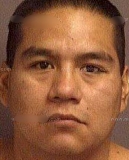
The disappearance of a loved one is a tragic event that no family should have to endure. In the case of Lyle Edwin Auck, who went missing from Fort Hall, Idaho on October 15, 2014, his family’s pain was only compounded by the knowledge that he had likely been the victim of a violent crime.
According to authorities, Auck was last seen alive on the day of his disappearance. Several days later, police received a tip that Anthony Ish had shot and killed him outside of Ish’s home after an argument. When they searched the area, they found a trail of blood that led away from the house, as well as shell casings from a 40-caliber weapon.
Ish was subsequently arrested and charged with assault with a deadly weapon. Police began searching for Auck’s body, but despite their efforts, they were unable to find it. However, in September 2015, Ish’s charge was upgraded to second-degree murder based on new evidence that had come to light.
At Ish’s trial in February 2017, witnesses testified that he and Auck had gotten into a fight at Ish’s birthday party, which had ended in Auck’s death. Four witnesses claimed to have seen Ish shoot Auck three or four times. Ish’s uncle also testified that he saw Ish drive away with Auck’s body in the back of a pickup truck after the murder, returning about half an hour later to ask for a shovel.
Based on this evidence, Ish was ultimately convicted of second-degree murder and assault with a deadly weapon. However, Auck’s family was left to wonder about his final resting place, and to grieve without the closure that comes with knowing where a loved one’s remains are located.
Their questions were finally answered in the autumn of 2018, when Auck’s remains were discovered. They were positively identified the following year, giving his family the opportunity to plan a traditional blessing and cleansing ceremony in accordance with their tribal customs, to honor his memory and begin to find closure.
The case of Lyle Edwin Auck is a tragic reminder of the violence that can occur in our communities, and of the impact that such violence can have on families and loved ones. While the discovery of his remains may provide some closure for his family, it cannot undo the pain and suffering that they have endured over the years.
It is important for us as a society to work together to prevent violence and to ensure that those who commit such acts are held accountable for their actions. This includes supporting law enforcement efforts to investigate crimes and bring perpetrators to justice, as well as working to address the underlying social and economic factors that can contribute to violence.
At the same time, we must also recognize the importance of supporting victims and their families in the aftermath of violent crime. This means providing resources and services to help them cope with their grief and trauma, and to rebuild their lives in the wake of tragedy.
In the case of Lyle Edwin Auck, his family has demonstrated incredible strength and resilience in the face of unimaginable loss. Their commitment to honoring his memory and finding closure is a testament to the enduring power of love and family, even in the most difficult of circumstances.
As a society, we owe it to them and to all victims of violent crime to do everything in our power to prevent such tragedies from occurring in the first place, and to support those who are left to pick up the pieces in their aftermath.